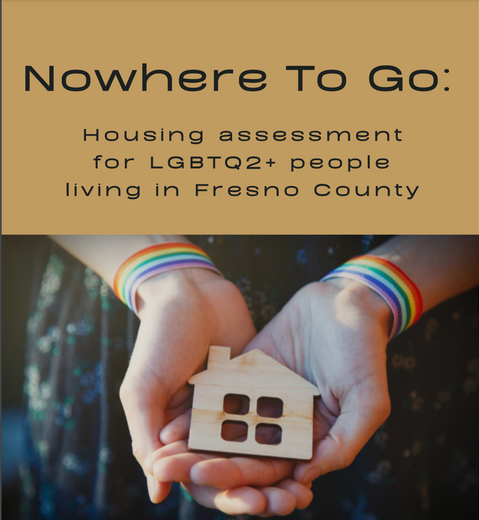A Fresno State professor and student are hoping their year-long work for a recently released housing report will improve access to housing and other resources for LGBTQ2+ individuals in Fresno.
The report, “Nowhere to Go: Housing Assessment for LGBTQ2+ People Living in Fresno County,” was released in May 2022 after being approved by Fresno State’s Institutional Review Board (IRB) in September 2020.
It used the term LGBTQ2+ to refer to individuals identifying as lesbian, gay, bisexual, transgender, queer and/or two-spirit, a term used by some Indigenous people who identify as having both a masculine and feminine spirit.
The report was a collaboration between professor Katherine Fobear of the Women, Gender and Sexuality Studies Department, Trans-E-Motion and the Economic Opportunity Commissions (EOC) LGBTQ2+ Resource Center.
However, the brunt of the research, writing and additional work was done by Fobear and her research assistant, Jordan Fitzpatrick, a first-year graduate student in the master’s in social work program.
Fobear and Fitzpatrick worked together on a 2019 transgender housing report, which they expanded and improved upon in creating the LGBTQ2+ housing assessment.
“Jordan and I worked together on developing the survey, as well as distributing it, doing qualitative interviews, and so forth,” Fobear said. “Hopefully this will continue forward and [we will] be able to get more students involved in the research.”
According to Fobear, this is the first time there has been published research made publicly available on LGBTQ2+ housing in the city of Fresno.
She highlighted the report’s statistics regarding discrimination by landlords and shelters against impacted individuals within Fresno, which she said pressures these individuals to “couch surf” or sleep on the streets rather than risk being discriminated against.
Though these forms of discrimination are illegal, the interviews conducted by Fobear and Fitzpatrick indicated they were frequent within the LGBTQ2+ community.
24.8% of the total population surveyed in the report said they had experienced homelessness within the past two years. Of those individuals, 52% reported being denied shelter or homeless services, with 40% attributing that denial to their sexual orientation and/or gender identity. Among those who had stayed in a shelter, 47% reported having consequently experienced a form of discrimination from shelter staff, according to their research.
“The people that we interviewed and surveyed who didn’t go to shelters said that they never even wanted to consider it because they knew that violence occurs at these places, whether that’s violence in regards to direct violence, or they get outed and then they get harassed and targeted later on,” Fobear said.
Fobear, who is also a board member of Trans-E-Motion, said the inspiration to conduct the research came due to the many requests coming to the organization regarding housing assistance, coupled with the lack of established research publicly available.
Much of the research presented in the housing assessment, she admits, is not surprising.
“A lot of it is just documenting what a lot of people who work within the community or experience it directly already know,” she said.
Fobear hopes the report will illustrate that LGBTQ2+ individuals need to have “a seat at the table.”
“We’re basically telling any organization, any community activist, anybody, [if] you want [to use or share the report], use it,” Fobear said. “That is the whole point of this thing, to get this to the communities so that they can also advocate — it’s meant to be a tool to assist.”
This report is considered a “pilot project,” but Fobear said she hopes it becomes an annual or biannual project in order to accurately track the levels of discrimination faced within the city by the LGBTQ2+ community.
Fobear and Fitzpatrick have previously worked together to advocate for gender-affirming care (GAC) to be offered on Fresno State’s campus to better serve the LGBTQ2+ community. GAC will be available to students, staff and faculty in fall 2022.
Fobear plans to continue to advocate for change in the city and on campus. She is currently working towards getting a minor added to Fresno State curriculum for LGBTQ+ studies, which she hopes will be available in fall 2022 as well.
“What I try to do in my work is to be able to open up space for a community and for other advocates to speak to issues they’ve already been speaking about. But if I can find any way to sort of turn up the volume? That’s heaven for me,” she said.




